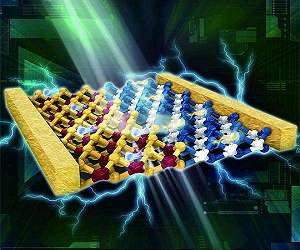Chemistry expert secures Humboldt Foundation funding to recruit scientists for nanomaterials research
An expert in nanomaterials who is based in Swansea and Germany has secured around Pounds 250,000 of funding from the Humboldt Foundation to recruit early-career scientists to join his research team.
Professor Christian Klinke, who works jointly at the University of Rostock in northern Germany and in Swansea University chemistry department, has been appointed as a Henriette Herz Scout by the Humboldt Foundation, one of the world’s most prestigious scientific organisations.
This allows him to select talented international scientists – one a year between now and 2024 – and recruit them for his research group.
Each scientist will receive a two-year fellowship from the Alexander von Humboldt Foundation.
The research group focuses on nanocrystalline materials, which are used in solar cells, light-emitting diodes, and fast transistors. It examines their properties, which are often determined by quantum mechanical effects.
The group already receives research funds from the Humboldt Foundation, and the new appointments will further strengthen its work.
Professor Christian Klinke said: “The research projects of the scholarship holders will make an important contribution to the projects of our interdisciplinary working group.
Though based in Germany, the scholarship holders will carry out joint research in co-operation with Swansea groups and may be involved in teaching Swansea students.”
Professor Owen Guy, head of Swansea chemistry department, added: “This prestigious award further strengthens the links between Swansea Chemistry and the University of Rostock, with the joint research and teaching activities adding a new dimension to the nanomaterials research portfolio at Swansea.”
Every year, the Alexander von Humboldt Foundation enables more than 2,000 researchers from all over the world to undertake an academic stay in Germany. The Foundation maintains an interdisciplinary network of over 30,000 Humboldtians, including Professor Klinke, in more than 140 countries.
The Henriette Herz programme was introduced by the Foundation to support young scientists.
Henriette Herz (1764-1847) was a writer and organiser of literary salons and discussion groups on scientific and philosophical topics. Participants included the von Humboldt brothers.
The programme aims to support female researchers in particular, which will be reflected in the appointments to be made by Professor Klinke.
Related Links
Swansea University
All About Solar Energy at SolarDaily.com
|
We need your help. The SpaceDaily news network continues to grow but revenues have never been harder to maintain. With the rise of Ad Blockers, and Facebook – our traditional revenue sources via quality network advertising continues to decline. And unlike so many other news sites, we don’t have a paywall – with those annoying usernames and passwords. Our news coverage takes time and effort to publish 365 days a year. If you find our news sites informative and useful then please consider becoming a regular supporter or for now make a one off contribution. |
||
|
SpaceDaily Contributor $5 Billed Once credit card or paypal |
SpaceDaily Monthly Supporter $5 Billed Monthly paypal only |
|

![]()
The structure-performance of bulk-heterojunction organic solar cells
Beijing, China (SPX) Jul 06, 2022
The active layer morphology of organic solar cells (OSCs) serves as the bridge that connects material properties with device performances, and thus the morphology is of critical importance in device fabrication. State-of-the-art power conversion efficiencies (PCEs) of OSCs based on p-type donor polymers and n-type non-fullerene acceptors (NFAs) forming multi-length-scale fibril interpenetrating networks are above 19% (Nature Materials, 2022, DOI:10.1038/s41563-022-01244-y). Such a morphology, composed o … read more
